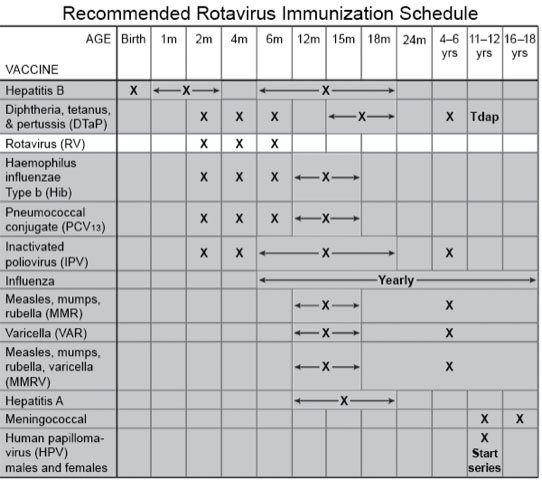Rotavirus Vaccine
Medically reviewed by Drugs.com. Last updated on Aug 4, 2025.
What do I need to know about the rotavirus vaccine?
The rotavirus vaccine is given to prevent rotavirus disease. Rotavirus causes severe diarrhea, vomiting, and fever. This can cause life-threatening dehydration.
When should my baby get the rotavirus vaccine?
Doses are normally given at 2 and 4 months. A third dose may be needed at 6 months. The vaccine is given in drops that your baby swallows.
 |
Who should wait to get the rotavirus vaccine?
Your baby may need to wait to get the vaccine if he or she has any of the following:
- Diarrhea or vomiting
- A weakened immune system, HIV, or cancer
- Current use of medicines such as steroids
What are reasons my baby may not get the rotavirus vaccine?
Talk to your baby's healthcare provider if your baby has any of the following:
- An allergic reaction to a dose of the vaccine, or a past reaction to any part of the vaccine
- No doses of the vaccine received by age 15 weeks
- Severe allergies, including a latex allergy
- Severe combined immunodeficiency (SCID)
- A bowel blockage now or in the past
What are the risks of the rotavirus vaccine?
Your baby may be irritable, or have mild diarrhea or vomiting. Bowel blockage may develop in rare cases. Your baby may still get rotavirus, even after the vaccine. He or she may have an allergic reaction to the vaccine. This can be life-threatening.
Treatment options
The following list of medications are related to or used in the treatment of this condition.
- measles virus vaccine/mumps virus vaccine/rubella virus vaccine/varicella virus vaccine
- ProQuad
- Rotarix
- RotaTeq
- rotavirus vaccine
Call your local emergency number (911 in the US) if:
- Your baby has signs of a severe allergic reaction, such as trouble breathing, hives, or wheezing.
When should I seek immediate care?
- Your baby shows signs of stomach pain, such as pulling his or her legs to the abdomen, or severe crying.
- Your baby vomits several times.
- You see blood in your baby's bowel movement.
- Your baby is weak or irritable.
- Your baby has a high fever, or you notice behavior changes that concern you.
When should I call my baby's doctor?
- You have questions or concerns about the rotavirus vaccine.
Care Agreement
You have the right to help plan your baby's care. Learn about your baby's health condition and how it may be treated. Discuss treatment options with your baby's healthcare providers to decide what care you want for your baby. The above information is an educational aid only. It is not intended as medical advice for individual conditions or treatments. Talk to your doctor, nurse or pharmacist before following any medical regimen to see if it is safe and effective for you.© Copyright Merative 2025 Information is for End User's use only and may not be sold, redistributed or otherwise used for commercial purposes.
Learn more about Rotavirus Vaccine
Treatment options
Care guides
- HPV (Human Papillomavirus)
- HPV (Human Papillomavirus) Vaccine for Adolescents
- HPV (Human Papillomavirus) Vaccine for Adults
- HPV (Human Papillomavirus) Vaccine for Children
Medicine.com guides (external)
Further information
Always consult your healthcare provider to ensure the information displayed on this page applies to your personal circumstances.
